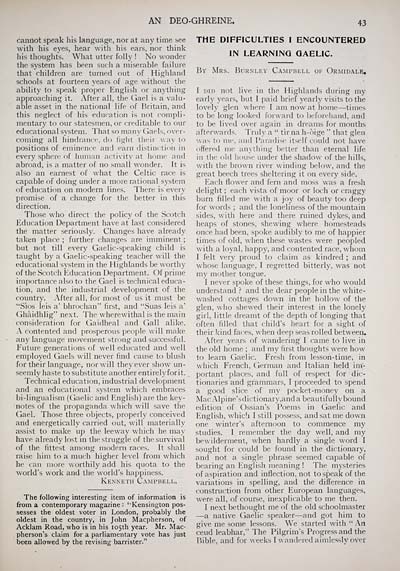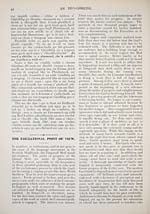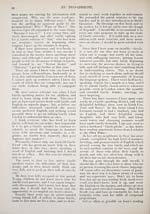Blair Collection > Deo-gréine
(61)
Download files
Complete book:
Individual page:
Thumbnail gallery: Grid view | List view

AN DEO-GHREINE.
43
cannot speak his language, nor at any time see
with his eyes, hear with his ears, nor think
his thoughts. What utter folly ! No wonder
the system has been such a miserable failure
that children are turned out of Highland
schools at fourteen years of age without the
ability to speak proper English or anything
approaching it. After all, the Gael is a valu-
able asset in the national life of Britain, and
this neglect of his education is not compli-
mentary to our statesmen, or creditable to our
educational system. That so many Gaels, over-
coming all hindrance, do light their way to
positions of eminence and earn distinction in
every sphere of human activity at home and
abroad, is a matter of no small wonder. It is
also an earnest of what the Celtic race is
capable of doing under a more rational system
of education on modern lines. There is every
promise of a change for the better in this
direction.
Those who direct the policy of the Scotch
Education Department have at last considered
the matter seriously. Changes have already
taken place ; further changes are imminent ;
but not till every Gaelic-speaking child is
taught by a Gaelic-speaking teacher will the
educational system in the Highlands be worthy
of the Scotch Education Department. Of prime
importance also to the Gael is technical educa-
tion, and the industrial development of the
country. After all, for most of us it must be
"Sios leis a' bhrochan" first, and "Suas leis a'
Ghàidhlig" next. The wherewithal is the main
consideration for Gaidheal and Gall alike.
A contented and prosperous people will make
any language movement strong and successful.
Future generations of well educated and well
employed Gaels will never find cause to blush
for their language, nor will they ever show un-
seemly haste to substitute another entirelyforit.
Technical education, industrial development
and an educational system which embraces
bi-lingualism (Gaelic and English) are the key-
notes of the propaganda which will save the
Gael. Those three objects, properly conceived
and energetically carried out, will materially
assist to make up the leeway which he may
have already lost in the struggle of the survival
of the fittest among modern races. It shall
raise him to a much higher level from which
he can more worthily add his quota to the
world's work and the world's happiness.
Kenneth Campbell.
THE DIFFICULTIES I ENCOUNTERED
IN LEARNING GAELIC.
By Mrs. Burnley Campbell of Ormidale.
The following interesting item of information is
from a contemporary magazine : ''Kensington pos-
sesses the oldest voter in London, probably the
oldest in the country, in John Macpherson, of
Acklam Road, who is in his 105th year. Mr. Mac-
pherson's claim for a parliamentary vote has just
been allowed by the revising barrister."
I did not live in the Highlands during my
early years, but I paid brief yearly visits to the
lovely glen where I am now at home — times
to be long looked forward to beforehand, and
to be lived over again in dreams for months
afterwards. Truly a " tìr na h-òige " that glen
was to me, and Paradise itself could not have
offered me anything better than eternal life
in the old house under the shadow of the hills,
with the brown river winding below, and the
great beech trees sheltering it on every side.
Each flower and fern and moss was a fresh
delight ; each vista of moor or loch or craggy
burn filled me with a joy of beauty too deep
for words ; and the loneliness of the mountain
sides, with here and there ruined dykes, and
heaps of stones, shewing where homesteads
once had been, spoke audibly to me of happier
times of old, when these wastes were peopled
with a loyal, happy, and contented race, whom
I felt very proud to claim as kindred ; and
whose language, I regretted bitterly, was not
my mother tongue.
I never spoke of these things, for who would
understand ? and the dear people in the white-
washed cottages down in the hollow of the
glen, who shewed their interest in the lonely
girl, little dreamt of the depth of longing that
often filled that child's heart for a sight of
their kind faces, when deep seas rolled between.
After years of wandering I came to live in
the old home ; and my first thoughts were how
to learn Gaelic. Fresh from lesson-time, in
which French, German and Italian held im-
portant places, and full of respect for dic-
tionaries and grammars, I proceeded to spend
a good slice of my pocket-money on a
Mac Alpine'sdictionary,and a beautifully bound
edition of Ossian's Poems in Gaelic and
English, which I still possess, and sat me down
one winter's afternoon to commence my
studies. I remember the day well, and my
bewilderment, when hardly a single word I
sought for could be found in the dictionary,
and not a single phrase seemed capable of
bearing an English meaning ! The mysteries
of aspiration and inflection, not to speak of the
variations in spelling, and the difference in
construction from other European languages,
were all, of course, inexplicable to me then.
I next bethought me of the old schoolmaster
— a native Gaelic speaker — and got him to
give me some lessons. We started with " An
ceud leabhar," The Pilgrim's Progress and the
Bible, and for weeks I wandered aimlessly over
43
cannot speak his language, nor at any time see
with his eyes, hear with his ears, nor think
his thoughts. What utter folly ! No wonder
the system has been such a miserable failure
that children are turned out of Highland
schools at fourteen years of age without the
ability to speak proper English or anything
approaching it. After all, the Gael is a valu-
able asset in the national life of Britain, and
this neglect of his education is not compli-
mentary to our statesmen, or creditable to our
educational system. That so many Gaels, over-
coming all hindrance, do light their way to
positions of eminence and earn distinction in
every sphere of human activity at home and
abroad, is a matter of no small wonder. It is
also an earnest of what the Celtic race is
capable of doing under a more rational system
of education on modern lines. There is every
promise of a change for the better in this
direction.
Those who direct the policy of the Scotch
Education Department have at last considered
the matter seriously. Changes have already
taken place ; further changes are imminent ;
but not till every Gaelic-speaking child is
taught by a Gaelic-speaking teacher will the
educational system in the Highlands be worthy
of the Scotch Education Department. Of prime
importance also to the Gael is technical educa-
tion, and the industrial development of the
country. After all, for most of us it must be
"Sios leis a' bhrochan" first, and "Suas leis a'
Ghàidhlig" next. The wherewithal is the main
consideration for Gaidheal and Gall alike.
A contented and prosperous people will make
any language movement strong and successful.
Future generations of well educated and well
employed Gaels will never find cause to blush
for their language, nor will they ever show un-
seemly haste to substitute another entirelyforit.
Technical education, industrial development
and an educational system which embraces
bi-lingualism (Gaelic and English) are the key-
notes of the propaganda which will save the
Gael. Those three objects, properly conceived
and energetically carried out, will materially
assist to make up the leeway which he may
have already lost in the struggle of the survival
of the fittest among modern races. It shall
raise him to a much higher level from which
he can more worthily add his quota to the
world's work and the world's happiness.
Kenneth Campbell.
THE DIFFICULTIES I ENCOUNTERED
IN LEARNING GAELIC.
By Mrs. Burnley Campbell of Ormidale.
The following interesting item of information is
from a contemporary magazine : ''Kensington pos-
sesses the oldest voter in London, probably the
oldest in the country, in John Macpherson, of
Acklam Road, who is in his 105th year. Mr. Mac-
pherson's claim for a parliamentary vote has just
been allowed by the revising barrister."
I did not live in the Highlands during my
early years, but I paid brief yearly visits to the
lovely glen where I am now at home — times
to be long looked forward to beforehand, and
to be lived over again in dreams for months
afterwards. Truly a " tìr na h-òige " that glen
was to me, and Paradise itself could not have
offered me anything better than eternal life
in the old house under the shadow of the hills,
with the brown river winding below, and the
great beech trees sheltering it on every side.
Each flower and fern and moss was a fresh
delight ; each vista of moor or loch or craggy
burn filled me with a joy of beauty too deep
for words ; and the loneliness of the mountain
sides, with here and there ruined dykes, and
heaps of stones, shewing where homesteads
once had been, spoke audibly to me of happier
times of old, when these wastes were peopled
with a loyal, happy, and contented race, whom
I felt very proud to claim as kindred ; and
whose language, I regretted bitterly, was not
my mother tongue.
I never spoke of these things, for who would
understand ? and the dear people in the white-
washed cottages down in the hollow of the
glen, who shewed their interest in the lonely
girl, little dreamt of the depth of longing that
often filled that child's heart for a sight of
their kind faces, when deep seas rolled between.
After years of wandering I came to live in
the old home ; and my first thoughts were how
to learn Gaelic. Fresh from lesson-time, in
which French, German and Italian held im-
portant places, and full of respect for dic-
tionaries and grammars, I proceeded to spend
a good slice of my pocket-money on a
Mac Alpine'sdictionary,and a beautifully bound
edition of Ossian's Poems in Gaelic and
English, which I still possess, and sat me down
one winter's afternoon to commence my
studies. I remember the day well, and my
bewilderment, when hardly a single word I
sought for could be found in the dictionary,
and not a single phrase seemed capable of
bearing an English meaning ! The mysteries
of aspiration and inflection, not to speak of the
variations in spelling, and the difference in
construction from other European languages,
were all, of course, inexplicable to me then.
I next bethought me of the old schoolmaster
— a native Gaelic speaker — and got him to
give me some lessons. We started with " An
ceud leabhar," The Pilgrim's Progress and the
Bible, and for weeks I wandered aimlessly over
Set display mode to: Large image | Transcription
Images and transcriptions on this page, including medium image downloads, may be used under the Creative Commons Attribution 4.0 International Licence unless otherwise stated. ![]()
| Early Gaelic Book Collections > Blair Collection > Deo-gréine > (61) |
|---|
| Permanent URL | https://digital.nls.uk/76698364 |
|---|
| Description | A selection of books from a collection of more than 500 titles, mostly on religious and literary topics. Also includes some material dealing with other Celtic languages and societies. Collection created towards the end of the 19th century by Lady Evelyn Stewart Murray. |
|---|
| Description | Selected items from five 'Special and Named Printed Collections'. Includes books in Gaelic and other Celtic languages, works about the Gaels, their languages, literature, culture and history. |
|---|

